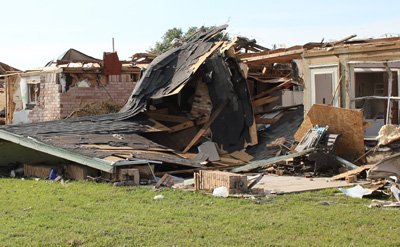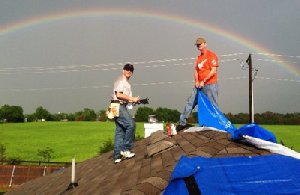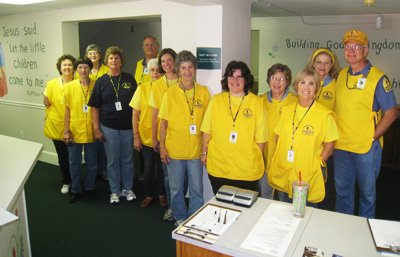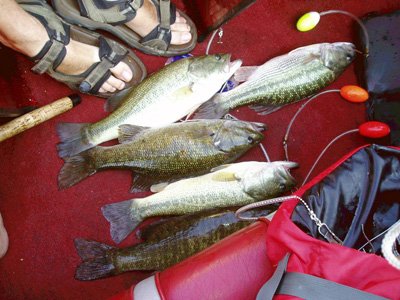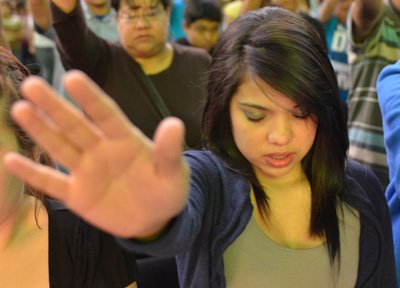Texas Baptist volunteers ‘Bike Out Hunger’
PRIDDY—The heat and hills faded from the cyclists' minds when they rolled into Priddy, a Mills County community southeast of Brownwood. What they saw made their six-day, 430-mile trek from San Antonio to Dallas through the heart of the state's Hill Country worthwhile.

Charity Stephens of Waco visits with a student in the Priddy Independent School District. Students greeted Bike Out Hunger riders who rode through their community, southeast of Brownwood. (PHOTO/Kaitlin Warrington/BGCT)
|
All the Priddy ISD students—elementary school through high school—lined the side of the school parking lot, many holding signs thanking the cyclists for riding to raise money to help hungry people through the Texas Baptist Offering for World Hunger. Of the 107 students in the school, 62 are eligible for the free or reduced-price lunch program.
The young people high-fived cyclists as they rode through the parking lot and surrounded them when they stopped.
"It felt like we're in the Tour de France or something," said Don Vanderslice, a member of First Baptist Church in Austin. "Kids are cheering for us and screaming. They've got their signs held up that they made in art class. Out of the miles and miles and miles I've ridden in my life, these last 10 or 15 minutes have been some of the most awesome of my entire life."
| {youtube}0IDzE3ok5WY{/youtube} |
For many participants, the stop in Priddy was the highlight of Bike Out Hunger, a cycling trip sponsored by the Baptist General Convention of Texas, Baptist Child and Family Services, Baylor Health Care System and Plano Cycling and Fitness to raise awareness about hunger needs across the state and raise funds to help hungry people regionally and globally.
"This year's ride, the third Bike Out Hunger, seemed to impact the riders more than the previous two," said Rand Jenkins, director of the BGCT communications office, who organized the ride.
"Stretch points and suppers hosted by local churches coupled with an emotional stop in Priddy allowed the riders to not only be encouraged but to also be an encouragement showing that people care about solving the hunger issue for families they've never met."
More than 25 cyclists from across the state tackled a route that began at the BCFS office in San Antonio, took them through Dripping Springs, Marble Falls, Lampasas, Comanche and Forth Worth and ended at Baylor Medical Center in Dallas. Along the way, cyclists visited with media outlets, as well as people they encountered along the route, talking about hunger issues.
"Whether we make it 450 miles or four miles, this is about raising awareness of the hunger issues that are facing Texas, facing the children, the families, the adults across our state and across the world," said Ryan Musser of Crawford.
Rick Gurney, a member of First Baptist Church in Plano who also owns Plano Cycling and Fitness, said many people assume people who live near them have the necessities of life. But that's simply not the case for far too many Texans. More than 1.7 million Texas children are food insecure.

Don Vanderslice examines a young artist's handiwork, as students in the Priddy Independent School District greeted Bike Out Hunger riders who rode through their community, southeast of Brownwood. (PHOTO/Kaitlin Warrington/BGCT)
|
"Hunger can bring tears to your eyes," Gurney said. "We take for granted all the things that are around us."
Compelled by their faith, the cyclists sought donations from their congregations, friends and families to help end hunger. All money given through Bike Out Hunger goes to the Texas Baptist Offering for World Hunger, which seeks to feed the hungry and help people out of poverty.
"I care because God commanded us to care about those who are less fortunate than we are," said Amy Sides of Lorena, who participated in the ride with her daughter, Samantha Collins of Austin.
The time has come to end hunger, said Scott Shelton, youth minister at First Baptist Church in Athens. By raising funds for the cause and awareness of the issue, Shelton hoped to be part of solving a widespread issue.
"I don't think there's really any good excuse why people die of lack of food when we have so much," he said.
For more information, visit www.bikeouthunger.com.
—Based on reports by Texas Baptist Communications staff.
